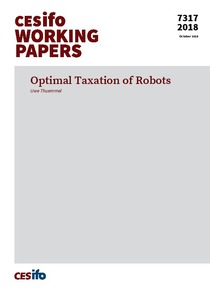Optimal taxation of robots
"I study the optimal taxation of robots and labor income. In the model, robots substitute for routine labor and complement non-routine labor. I show that while it is optimal to distort robot adoption, robots may be either taxed or subsidized. The robot tax exploits general-equilibrium effects t...
| Main Author: | |
|---|---|
| Institution: | ETUI-European Trade Union Institute |
| Format: | TEXT |
| Language: | English |
| Published: |
Munich
2018
CESifo |
| Subjects: | |
| Online Access: | https://www.labourline.org/KENTIKA-19136504124919547869-optimal-taxation-of-robots.htm |
| Summary: | "I study the optimal taxation of robots and labor income. In the model, robots substitute for routine labor and complement non-routine labor. I show that while it is optimal to distort robot adoption, robots may be either taxed or subsidized. The robot tax exploits general-equilibrium effects to compress the wage distribution. Wage compression reduces income-tax distortions of labor supply, thereby raising welfare. In the calibrated model, the optimal robot tax for the US is positive and generates small welfare gains. As the price of robots falls, inequality rises but the robot tax and its welfare impact become negligible." |
|---|---|
| Physical Description: | 67 p. Digital |

